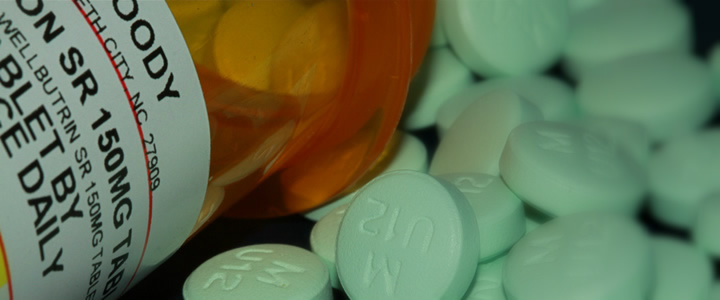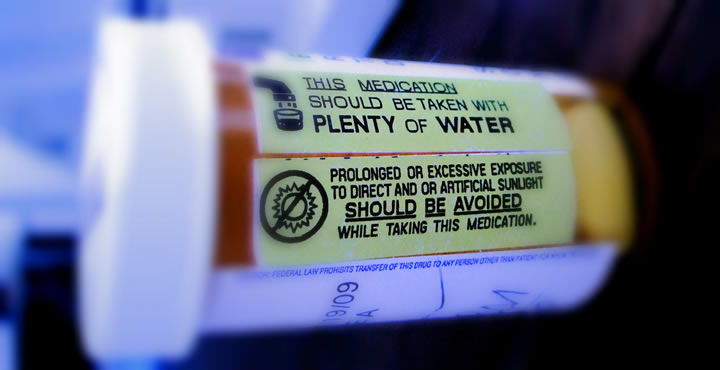25 Most Severe Caffeine and Drug Interactions

Caffeine can sometimes have moderate to severe reactions with other medications a person may be taking.
According to one study almost 70% of the population of a County in New York was prescribed at least one prescription drug and gives a clue to what is likely happening elsewhere in the USA.
So with caffeine consumption being at an all time high and prescription drug use being more prevalent than it’s ever been, there is even greater risk for negative caffeine and prescription drug interactions to occur.
Here are the 25 most common drugs known to most severely interact with caffeine as well as the symptoms that could result.
Prescription Drug/ Caffeine Interactions
| Prescription Drug | Symptoms of Interaction |
|---|---|
| Adenosine | Caffeine prevents adenosine from working as intended. |
| Alosetron | Caffeine increases blood concentrations of this drug, leading to potentially life threatening side effects. |
| Anagrelide | Swelling, increased heart rate, low blood pressure, irregular heartbeat. |
| Asenapine | Caffeine increases blood concentrations of asenapine beyond what is considered safe. |
| Bendamustine | Affects bone marrow functioning resulting in anemia, bleeding, and infections. |
| Ciprofloxacin | Increases caffeine’s effects, which could cause headaches, high blood pressure, restlessness, insomnia, and nervousness. |
| Deferasirox | Can almost double the amount of caffeine in the blood due to interfering with caffeine’s half life. |
| Dipyridamole | Interferes with this drugs intended purpose requiring larger doses than would be expected. |
| DULoxetine | Increases risk for DULoxetine side effects like: nausea, dry mouth, insomnia, drowsiness, and constipation. |
| Enoxacin | Increases the effects of caffeine, which could result in overdose symptoms. |
| FluvoxaMINE | Increases caffeine’s effects leading to caffeine overdose symptoms. |
| Grepafloxacin | Increases the effects of caffeine, which could result in overdose symptoms. |
| Hydroxyprogesterone | Prevents caffeine from working as intended, which requires larger doses of caffeine to get desired results. |
| Lithium | Changing caffeine consumption can lead to Lithium toxicity: nausea, vomiting, diarrhea, drowsiness, muscle weakness, tremor, lack of coordination, blurred vision, or ringing in your ears. |
| Methotrexate | Causes methotrexate to fail as it should to relieve rheumatoid arthritis. |
| Nalidixic acid | Increases the effects of caffeine, which could result in overdose symptoms. |
| Norfloxacin | Increases caffeine’s effects leading to caffeine overdose symptoms. |
| Pimozide | Increases blood levels of pimozide, which could affect heart rhythm. |
| Rasagiline | May increase the effects of rasagiline, which could lead to severe headache, visual disturbances, confusion, stupor or coma, seizures, chest pain, unexplained nausea or vomiting, and stroke-like symptoms. |
| Regadenoson | Decreases the effectiveness of regadenoson causing it to not work as intended. |
| rOPINIRole | Causes too much rOPINIRole in the blood stream leading to confusion, vomiting, weakness, fainting, agitation, and drowsiness. |
| Theophylline | Increases risk of side effects of theophylline such as convulsions, tremors, insomnia, vomiting, heart palpitations. |
| Thiabendazole | Increases the effects of caffeine, which could result in overdose symptoms. |
| Tizanidine(Zanaflex) (severe) | Low blood pressure, dizziness, light-headedness, and fainting. |
| Vemurafenib | Increases caffeine’s effects leading to caffeine overdose symptoms. |
According to drugs.com who also furnished the above data, there are 82 known drug interactions with caffeine. In the table above we included the 25 that are classified as severe to moderately severe.
We only included the generic names of these drugs and some can be found in pills that have the substance combined with other drugs. Check your prescription drug’s label information carefully and/or ask your pharmacist if you aren’t sure.
What to Do If You Suspect Drug Interaction

If you suspect that caffeine is interacting with one of the above prescription drugs or another drug you are taking, it’s important to follow the following steps to ensure your safety.
- Call your doctor and discuss the situation as there may be alternative treatments.
- Never stop taking either the prescription medication or caffeine until you get instructions from your doctor.
- If reactions are severe, seek immediate medical attention.
- If the doctor tells you to avoid caffeine, gradually step down consumption to lesson withdrawal symptoms.
- Use our caffeine database to be aware of drinks or food that could contain hidden caffeine.
Being proactive in understanding the prescription medication you are taking and its possible interactions with caffeine and other drugs can go a long way in ensuring your safety and assisting the drug’s likelihood of treating your illness as intended.
It may seem daunting to read over all the safety information that now comes with most medications, but usually your pharmacist will be happy to help you understand the often complex information.
Taking a little time to understand the drug you have been prescribed can prevent severe unwanted side effects which could result from caffeine’s interaction.

Get Help Quitting Caffeine
Reduce your caffeine intake without pain and discomfort.
Download our FREE ebook




